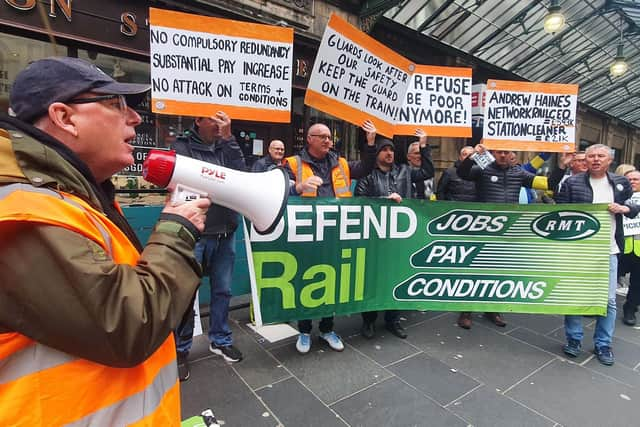UK strikes: If you think strikes are irritating, try poor pay and working conditions - Alexander Brown
This includes nurses and ambulance staff south of the border, as well as teachers and railway workers across the UK, with firefighters also considering industrial action.
Quiet quitting is over. We are in the age of direct action with you, dear reader, or someone you know almost certainly going on strike.
Advertisement
Hide AdAdvertisement
Hide AdAs a result, you’re also incredibly likely to have heard idiotic takes from pundits saying how awful strikes are. How dare they, they’re going to ruin Christmas.


These charlatans whining about strikes are among the same who tell young people to shut up about owning property and to show some blitz spirit.
They are also likely the same people who criticised refuse workers striking during the Edinburgh Fringe Festival, somehow missing the fact the timing amplifies the action’s power, raising awareness with more people impacted.
Now I know it's awful being inconvenienced. I, for one, abhor slow walkers and think someone sitting next to me on the train should be illegal.
But they are just inconveniences and it’s the same for strikes. Unlike a dog, a strike is just for Christmas, but poor conditions last much longer.
Inflation is soaring, but pay is not. We all have the same amount of money, but it has less value and it isn’t fair, so people are asking for more.
It isn’t selfish to want better for yourself and your family. That is supposed to be a Conservative ideal, but instead workers are looked at like Oliver Twist asking for more.
This comes at a time where it’s controversial to want a tax on the £170 billion energy company profits, so that’s where the discourse is, and it is absurd.
Advertisement
Hide AdAdvertisement
Hide AdTwitter owner Elon Musk even called those going on strike at the New York Times “woke”, because he’s a billionaire and why should other people live above the bread line.
Yet despite everything, there remains power in a union. The 1970 Equal Pay Act was introduced as a direct result of the 1968 Ford sewing machinists strike, when women workers walked out after their jobs were downgraded.
Before trade unions, workers could have 16 hour days, which in my informed political opinion sounds bloody horrible. Strikes in the 1880s changed that, with eight-hour working days becoming the norm.
Trade unions fought for holiday with pay, new parent's leave from work, the equal pay act.
Yet at a time when all of us are getting poorer, there remains a desire among some to rally support against the worker, with diatribes delivered on the likes of GB News, as well as actual news organisations.
Despite this, the public have still not turned on the strikes. Many people, while not being happy about the strikes, support the National Union of Rail, Maritime and Transport Workers refusal to work overtime over the festive period.
If you support the cause of the strike, but not the means, the obvious question is “how would you deliver the change then?”. With no answer, the solution is strike.
Labour have hidden on the issue of strikes, seeing it as a trap that would gift attack lines to the Tories, who have sought to toughen laws banning them.
It isn’t controversial to want improved conditions, and the sooner politicians realise that, the better.
Comments
Want to join the conversation? Please or to comment on this article.
